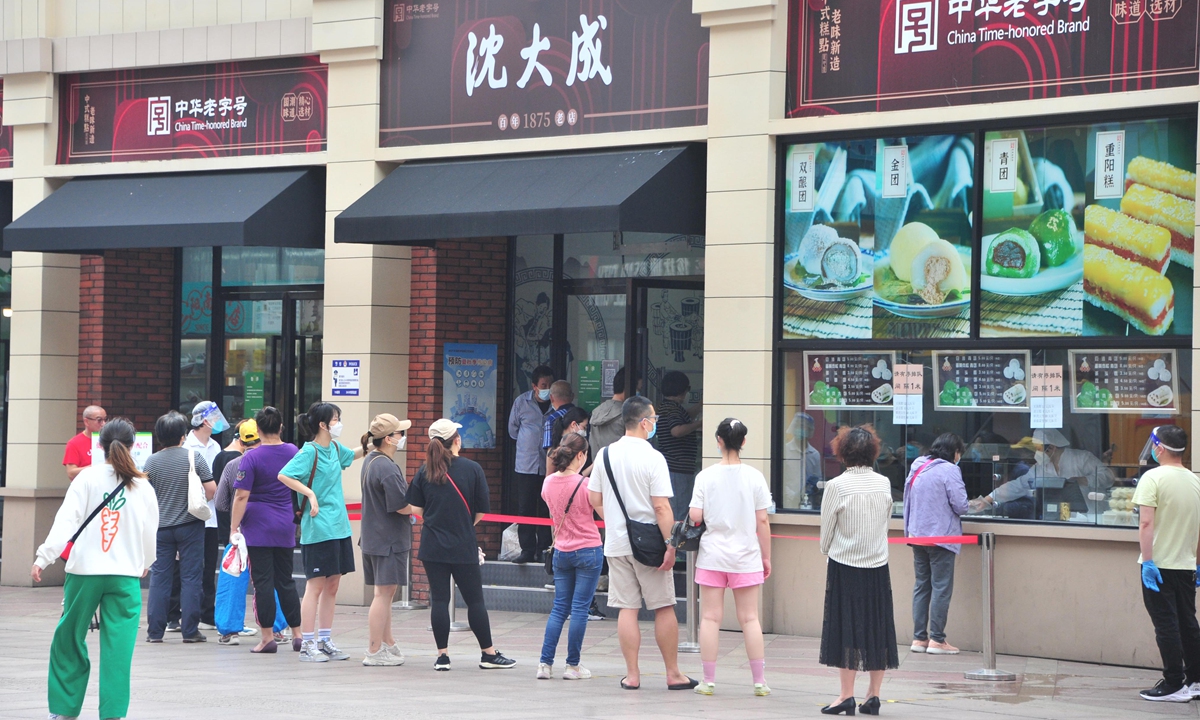
People return to the busy street of Nanjing Road in Shanghai and wait in line to buy traditional Chinese food on May 30, 2022, after the city announces plans to reopen residential compounds after more than two months of lockdown. Photo: IC
One day before Shanghai is set to lift its two-month lockdown to contain COVID-19 resurgence, shopping malls and stores are making last-minute preparations. They're adjusting their opening time, rolling out sales promotions and stocking up on products for the city's restart of economic activities, which they anticipate will fuel a consumption recovery.
Starting from Wednesday, Shanghai's outdoor A-level tourism sites will reopen to the public in an orderly way, with visitor flows no more than 75 percent of their maximum capacity, Shanghai Vice Mayor Zong Ming said at a press conference on Tuesday.
Malls, supermarkets, convenience stores, pharmacies and other shops will also resume on-site business. Cinemas, theaters, gyms and other enclosed sites will remain closed for the time being.
The metropolis' reopening will come one day ahead of the three-day Dragon Boat Festival holidays, not a hugely hot season for tourism or consumption in most years but still a period that could drive some holiday consumption like dining and short-distance travel.
Several malls and food companies told the Global Times that they are busy making preparations for the city's reopening, which will definitely mean more customers.
Germany-based supermarket chain Metro, for example, said that it is reaching out to suppliers ahead of time, as well as increasing the quantity of products in stock.
For major projects related to daily life, such as fish, meat, vegetables and eggs, Metro plans to have three to five times the normal level of inventories, the company said in a statement it sent to the Global Times, noting that its eight stores in Shanghai began to resume business gradually in May.
Many companies are launching promotions or other activities as they look for a rebound in consumption after Shanghai lifts its lockdown and during the upcoming festival. McDonald's, for example, told the Global Times that it will relaunch its night market in late June as life gets back to normal. It also launched some new products for the Children's Day festival on Wednesday.
The company is stocking up on some products in partnership with suppliers, trying to make sure all items on its normal menus are available.
Metro has also prepared for a consumption recovery. Shelves will be filled with Zongzi, a special festival food for the Dragon Boat holiday, and it will launch promotions like lotteries and consumption coupons in June, trying to grasp business opportunities in the post-pandemic period.
Some stores and malls are making detailed arrangements for pandemic-prevention work as they welcome more customers.
Supermarket chain Costco, for instance, told the Global Times that it will follow several measures to stamp out COVID-19 risks in its Shanghai store, such as checking 48-hour nucleic acid test results for drivers who transport its products and increasing disinfection frequency for areas that customers frequency touch. The supermarket will also use tools like digital guards to improve customer entry process.
The companies' efforts to spur post-lockdown spending come along with forceful measures by the government to encourage consumption. On Sunday, Shanghai launched 50 measures to help companies resume production as well as relieve their difficulties.
For example, the city will give a 10,000-yuan ($1,502) subsidy to customers who replace old cars with electric vehicles, and it will encourage trade companies and e-commerce platforms to issue consumption coupons.
Experts are confident that a consumption recovery will take place in Shanghai after two months of lockdown, but they are cautious as to the extent of such a rebound, saying that it is likely to be milder than the spending recovery in 2020.
"Some losses in consumption, like travel, cannot be made up for, as when the peak season is gone, it is gone. The economic consequences of the epidemic, like lower profits or personal incomes, will also hinder people's willingness to spend," Wu Chaoming, deputy head of the Chasing Research Institute, told the Global Times on Tuesday.
He predicted that retail sales will contract again in May, but they may return to growth in June with the help of stimulus policies.
China's retail sales dropped by 11.1 percent year-on-year in April to 2.94 trillion yuan, data from the National Bureau of Statistics showed.




